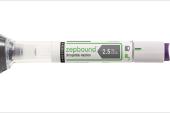Tirzepatide Eases Obstructive Sleep Apnea in Patients With Obesity
Top-line findings from the SURMOUNT-OSA trials may have implications for cardiometabolic risks in this population.

Tirzepatide (Zepbound and Mounjaro), which is approved for chronic weight management and treatment of type 2 diabetes, has significant benefits for patients with moderate-to-severe obstructive sleep apnea (OSA) and obesity, according to top-line results of the phase III SURMOUNT-OSA trials announced Wednesday by drugmaker Lilly.
The dual glucose-dependent insulinotropic polypeptide (GIP) and glucagon-like peptide-1 (GLP-1) receptor agonist provided significant reductions in mean apnea-hypopnea index (AHI)—a measure of sleep apnea severity—compared with placebo, meeting the studies' primary endpoints irrespective of whether patients were on positive airway pressure (PAP) therapy.
Treatment reduced mean AHI by 62.8% from baseline in patients on PAP therapy (versus 6.4% with placebo) and by 55.0% from baseline in patients not on PAP therapy (versus 5.0% with placebo).
These improvements in sleep apnea severity may have cardiovascular implications. “OSA can have serious cardiometabolic complications, contributing to hypertension, coronary heart disease, stroke, heart failure, atrial fibrillation, and type 2 diabetes,” according to the company press release.
SURMOUNT-OSA consisted of two 52-week studies of adults with moderate-to-severe OSA: Study 1 included those not on PAP therapy, while Study 2 included those who were on and planned to continue PAP therapy. Tirzepatide injection was administered at a maximum tolerated dose of 10 or 15 mg.
In Study 1, tirzepatide reduced mean AHI by 27.4 events per hour (versus 4.8 events per hour with placebo). The corresponding reductions in Study 2 were 30.4 and 6.0 events per hour.
Treatment also reduced mean body weight by 18.1% and 20.1% from baseline, in Study 1 and 2, respectively, compared with 1.3% and 2.3% with placebo. That degree of weight loss occurred “in a patient population that was comprised of approximately 70% males, who are known to achieve less weight loss with incretin therapy than females,” Lilly noted.
Safety was consistent with prior trials of the drug, with the most common adverse events being GI-related “and generally mild to moderate in severity”—they included diarrhea, nausea, vomiting, and constipation.
These results will be presented during a symposium at the American Diabetes Association’s annual meeting in June. The company plans to submit them for review by the US Food and Drug Administration and other global regulators.
Todd Neale is the Associate News Editor for TCTMD and a Senior Medical Journalist. He got his start in journalism at …
Read Full BioSources
Eli Lilly and Company. Tirzepatide reduced sleep apnea severity by up to nearly two-thirds in adults with obstructive sleep apnea (OSA) and obesity. Published and accessed on: April 17, 2024.





Comments